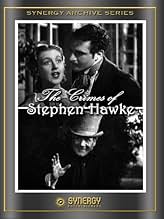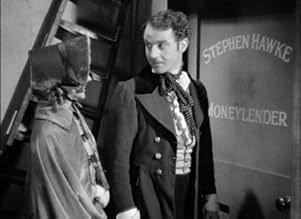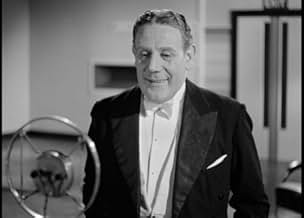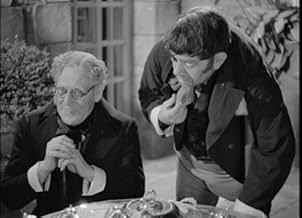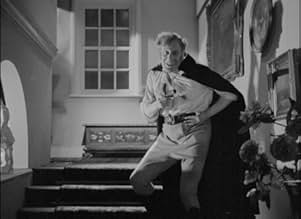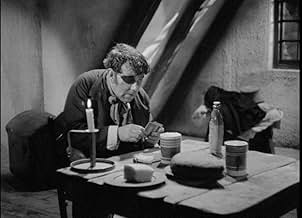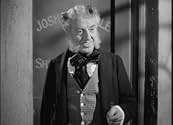Un tueur fou connu sous le nom de "The Spinebreaker" terrorise Londres en commettant une série de meurtres atroces. La police semble impuissante à l'arrêter.Un tueur fou connu sous le nom de "The Spinebreaker" terrorise Londres en commettant une série de meurtres atroces. La police semble impuissante à l'arrêter.Un tueur fou connu sous le nom de "The Spinebreaker" terrorise Londres en commettant une série de meurtres atroces. La police semble impuissante à l'arrêter.
- Réalisation
- Scénario
- Casting principal
Graham Soutten
- Nathaniel
- (as Ben Soutten)
B.C. Hilliam
- Self
- (as Flotsam)
Malcolm 'Mr. Jetsam' McEachern
- Self
- (as Jetsam)
Cecil Bevan
- Small Boy's Father
- (non crédité)
Annie Esmond
- Small Boy's Nanny
- (non crédité)
Jack Sharp
- Policeman
- (non crédité)
Harry Terry
- First Prisoner
- (non crédité)
Ben Williams
- Prison Warder
- (non crédité)
Avis à la une
On the positive, Tod Slaughter did a great job of playing Stephen Hawke, there seems to be little 'extras' in making the characters a bit unique. He reminded me a bit of George C. Scott in action like Mr. Scrooge and Jon Pertwee in visual acting. The first half was a slick story, albeit a little slow to start. The ending was interesting, so not disappointed there either.
Writing became a bit unraveled half way through though, characters seem to be 'slipping' and the damsel in distress a bit static. Villains and heroes announce their plans to their adversary and delay actions that would guarantee success. Instead, they opt for gamesmanship presumably to build superficial drama.
The book-ending of a radio show was odd, awkward, and not really surprised to see the man snoozing in the chair. Funny, but accurate. If you've got the time, then the film is an okay watch, but not likely memorable.
Writing became a bit unraveled half way through though, characters seem to be 'slipping' and the damsel in distress a bit static. Villains and heroes announce their plans to their adversary and delay actions that would guarantee success. Instead, they opt for gamesmanship presumably to build superficial drama.
The book-ending of a radio show was odd, awkward, and not really surprised to see the man snoozing in the chair. Funny, but accurate. If you've got the time, then the film is an okay watch, but not likely memorable.
In Victorian England there lives a kindly moneylender called Stephen Hawke. But underneath his public mask he is an underhand cad. Aided by his hunchback henchmen, he is also the serial killer known as The Spine Breaker. He is so evil he even begins the movie by murdering a child!
This film unusually opens at a BBC radio station, where we are introduced to lead actor Tod Slaughter. We also get a song and, of all things, a comedy butcher act. Slaughter pitches up and speaks briefly about the upcoming movie. I am guessing that this extra material was quite typical of its day where we had cinematic programmes that ran for hours encompassing all manner of things beyond the main feature, such as newsreels, cartoons, etc. Whatever the case, it's a strange way to open the movie now but does offer up a time capsule to an earlier era which is quite interesting.
The film itself is one of several British Victorian melodramas directed by George King, starring Slaughter. I have a soft spot for these movies as their lurid plot-lines and period detail make them more interesting than most B-movies from the time. And, most of all, they have the charismatic Slaughter as the villain in the main role. He really is a fun actor to watch and no one chews up the scenery quite like him it has to be said. This one follows a similar template to all the rest of these films where he is a pillar of the community who secretly is a ghastly criminal. While this one is basically the same, I don't think it is among his best. The plot-line is a little too uncoordinated and doesn't make use of Slaughter as well as it could. Nevertheless, it's one that should still appeal to most of his fans and I still liked it.
This film unusually opens at a BBC radio station, where we are introduced to lead actor Tod Slaughter. We also get a song and, of all things, a comedy butcher act. Slaughter pitches up and speaks briefly about the upcoming movie. I am guessing that this extra material was quite typical of its day where we had cinematic programmes that ran for hours encompassing all manner of things beyond the main feature, such as newsreels, cartoons, etc. Whatever the case, it's a strange way to open the movie now but does offer up a time capsule to an earlier era which is quite interesting.
The film itself is one of several British Victorian melodramas directed by George King, starring Slaughter. I have a soft spot for these movies as their lurid plot-lines and period detail make them more interesting than most B-movies from the time. And, most of all, they have the charismatic Slaughter as the villain in the main role. He really is a fun actor to watch and no one chews up the scenery quite like him it has to be said. This one follows a similar template to all the rest of these films where he is a pillar of the community who secretly is a ghastly criminal. While this one is basically the same, I don't think it is among his best. The plot-line is a little too uncoordinated and doesn't make use of Slaughter as well as it could. Nevertheless, it's one that should still appeal to most of his fans and I still liked it.
Todd Slaughter is at it again folks,, this time playing a well -mannered banker by day, and being a father to his adopted daughter , but by night folks he becomes...... wait for it..... the Spinebreaker.. very gruesome killer. he kills the rich I guess because he figures that they don't need it. In the Daytime he plays a successful banker, and he also protects his adopted daughter from a potential suitor whom he doesn't really like that much,, I really liked this one because it moved quickly , there was very good dialogue between the characters, and there was some action and mystery,, very good film for the time period.. and Todd Slaughter continues to shine in this horror film.
Meandering tale of meek money lender Steven Hawke (Slaughter) who moonlights as a callous killer nicknamed "The Spine Breaker" for his bone crushing exploits. When his alter ego is exposed, he's forced to flee London, pursued by a relentless hunter but must make a daring return after hearing news that his daughter has been coerced into marrying a blackmailing prison warden.
Great comical thrills with the inimitable Tod Slaughter delivering his trademark psychopath with pompous relish. Eric Portman is the principal adversary and preferred suitor to the twisted killer's beloved daughter (Taylor), demonstrating the thespian skills for which he became better known throughout the next three decades.
If you're unaccustomed to the Tod Slaughter experience, then this I'd regard to be one of the better samples to gain a taste of the stage-borne flavour with which he interprets his twisted characterisations. The dialogue is poetic, loaded with double-entendres, witty quips and of course, hopelessly clichéd plot. Despite the low budget, it works like a charm, such is Slaughter's unique charisma and presence.
Great comical thrills with the inimitable Tod Slaughter delivering his trademark psychopath with pompous relish. Eric Portman is the principal adversary and preferred suitor to the twisted killer's beloved daughter (Taylor), demonstrating the thespian skills for which he became better known throughout the next three decades.
If you're unaccustomed to the Tod Slaughter experience, then this I'd regard to be one of the better samples to gain a taste of the stage-borne flavour with which he interprets his twisted characterisations. The dialogue is poetic, loaded with double-entendres, witty quips and of course, hopelessly clichéd plot. Despite the low budget, it works like a charm, such is Slaughter's unique charisma and presence.
You owe it to yourself to see at least one Tod Slaughter film. His signature movie Sweeney Todd, The Demon Barber of Fleet Street or the career overview Crimes at the Dark House are two of the best examples, but The Crimes of Stephen Hawke is a worthwhile introduction to his work. Like most of the early Slaughter movies it seems uneasy about the (then) new film medium favouring more common forms of entertainment. His debut film Maria Marten or the Murder in the Red Barn opens with the entire cast being introduced like in a play and Crimes opens like a radio show complete with some hard to watch variety acts (singers Flotsom and Jetsom and a `comic' butcher) before Tod Slaughter is brought on to introduce his latest piece of `Strong Meat'. In the subsequent film/ radio play Slaughter (real name: Norman Carter Slaughter) plays the title role, an outwardly respectable moneylender who is really serial killer `The Spinebreaker' nicknamed for his ability to snap his victim's spines. His long time friend Joshua becomes his latest victim, however upon discovering the guilty party Jossua's son seeks revenge, forcing Hawke and his sidekick, an eyepatch wearing, one legged hunchback to flee, leaving Hawke's adopted daughter in the blackmailing hands of an upper class `lecherous brute'. For a film that barely passes the hour mark this manages to cram allot in, including a fake `talking' corpse, Hawke sent to jail for a year (for stealing a loaf of bread!), the obligatory romance, the honest guy vs the slimey rich guy for Hawke's daughter's hand and even some unexpected sensitivity. Its worth noting that the British censors banned all horror films during the WW2 years, although this falls a few years short of the censor's ban, during that time Slaughter was still making `meldrodramas' with tent pegs pounded into heads, human flesh stuffed into meat pies and lines like `I'll feed your entrails to the pigs' that were far more lurid than any banned Hollywood horror movie. Crimes opens to a sadistic scene where a pompous child is attacked by Slaughter and has his back broken, such scenes like that are not common in British movies of the time. Equally don't look for sub-plots about people being tortured with whips in Ealing comedies. Yet Slaughter's performance is incredible, extremely theatrical and barnstorming par excellence. You can almost hear the boos from the audience as he exits a scene giggling and cackling after `coming to grips' with some unfortunate. Some of the berserk expressions he makes in this film as he breaks spines makes it hard to believe he hadn't completely lost his mind. Call it hammy or over the top, but you'll never forget it. The director George King deserves credit for preserving most of Slaughter's body of work on film (even if he doesn't do it very well). Seemingly more comfortable on stage than on film, Slaughter's movies are little more than filmed plays, with cardboard sets, minimal (if any) camera movement, and unexceptional repertory players. Slaughter is the only reason to watch any of his films, for further proof see King's other Slaughter-less films like The Case of the Frightened Lady (1941) the old magic simply isn't there. Tales from Slaughter's theatre days are both hilarious and the stuff of legend. Actresses not needed would dress as nurses (in case anyone died of a heart attack), while Slaughter reviled in the sort of grand guignol butchery that could never be shown on film and would walk around after the show in blood stained clothes. Whether all these tales are true its hard to know. My relatives remember seeing the guy `live' sometime in the Forties and the man himself definitely left an impression running around the audience covered in blood (actually beetroot juice), waving a big knife and offering to `polish people off'. Now dead for nearly half a century, Slaughter's films are the nearest we'll ever come to experiencing such mad genius first hand. Technically the movies should be unwatchable, but they exert a strange fascination that you'll have to see for yourself, there really hasn't been anything like them before or since.
Le saviez-vous
- AnecdotesMarjorie Taylor's debut.
- Citations
Joshua Trimble: Yes, my boy. When people talk of flint-hearted money-lenders, they can't have met Stephen!
- ConnexionsFeatured in Doom Asylum (1988)
Meilleurs choix
Connectez-vous pour évaluer et suivre la liste de favoris afin de recevoir des recommandations personnalisées
Détails
- Durée
- 1h 9min(69 min)
- Couleur
- Mixage
- Rapport de forme
- 1.37 : 1
Contribuer à cette page
Suggérer une modification ou ajouter du contenu manquant

